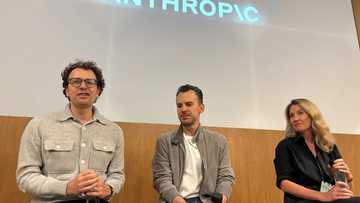AI giant Anthropic to pay $1.5 bn over pirated books

Source: AFP
Anthropic will pay at least $1.5 billion to settle a US class action lawsuit over allegedly using pirated books to train its artificial intelligence (AI) models, according to court documents filed Friday.
"This landmark settlement far surpasses any other known copyright recovery," said plaintiffs' attorney Justin Nelson. "It is the first of its kind in the AI era."
The settlement stems from a class-action lawsuit filed by authors Andrea Bartz, Charles Graeber, and Kirk Wallace Johnson, who accused Anthropic of illegally copying their books to train Claude, the company's AI chatbot that rivals ChatGPT.
In a partial victory for Anthropic, US District Court Judge William Alsup ruled in June that the company's training of its Claude AI models with books -- whether bought or pirated -- so transformed the works that it constituted "fair use" under the law.
"The technology at issue was among the most transformative many of us will see in our lifetimes," Alsup wrote in his decision, comparing AI training to how humans learn by reading books.
However, Alsup rejected Anthropic's bid for blanket protection, ruling that the company's practice of downloading millions of pirated books to build a permanent digital library was not justified by fair use protections.
"We remain committed to developing safe AI systems that help people and organizations extend their capabilities, advance scientific discovery, and solve complex problems," Anthropic deputy general counsel Aparna Sridhar said in response to an AFP inquiry.
Thousands of books
According to the legal filing, the settlement covers approximately 500,000 books, translating to roughly $3,000 per work -- four times the minimum statutory damages under US copyright law.
Under the agreement, Anthropic will destroy the original pirated files and any copies made, though the company retains rights to books it legally purchased and scanned.
"This settlement sends a strong message to the AI industry that there are serious consequences when they pirate authors' works to train their AI, robbing those least able to afford it," said Mary Rasenberger, CEO of the Authors Guild, in a statement supporting the deal.
The settlement, which requires judicial approval, comes as AI companies face growing legal pressure over their training practices.
Multiple lawsuits against firms including OpenAI, Meta, and others remain pending, with rightsholders arguing that scraping copyrighted content without permission violates intellectual property law.
San Francisco-based Anthropic announced this week that it raised $13 billion in a funding round valuing the AI startup at $183 billion.
It will use the capital to expand capacity, deepen safety research, and support international expansion.
Anthropic competes with generative AI offerings from Google, OpenAI, Meta, and Microsoft in a race that is expected to attract hundreds of billions of dollars in investment over the next few years.
Heavily backed by Amazon, Anthropic was founded in 2021 by former OpenAI executives and has grown rapidly since Claude's initial release in early 2023, with its annual revenue rate quintupling to $5 billion since early this year.
Source: AFP




